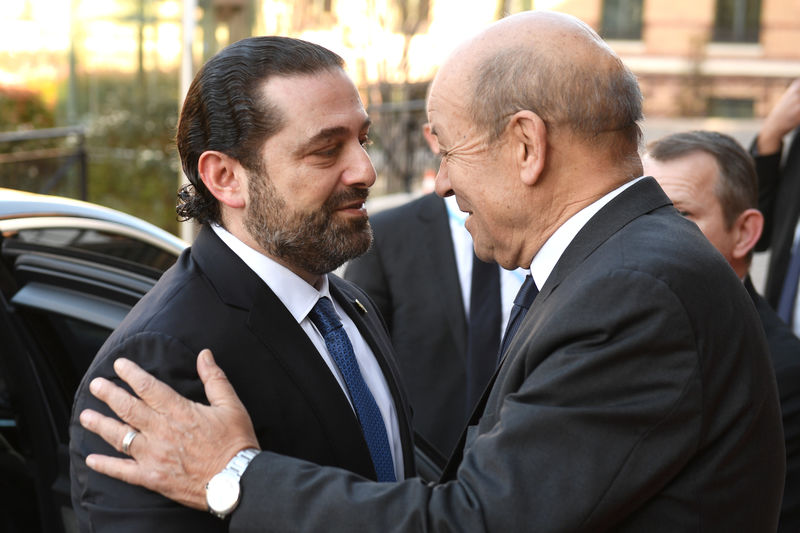 © Reuters. Lebanese Prime Minister Saad Hariri is welcomed by French Foreign Minister Jean-Yves Le Drian as they attend the Cedar Conference for international donors and investors to support Lebanon’s economy in Paris
© Reuters. Lebanese Prime Minister Saad Hariri is welcomed by French Foreign Minister Jean-Yves Le Drian as they attend the Cedar Conference for international donors and investors to support Lebanon’s economy in ParisBy John Irish
PARIS (Reuters) – Foreign states have pledged about $2.8 billion in loans and grants to support the Lebanese economy, a senior advisor to the Lebanese prime minister said.
The pledges came at a donors conference in Paris on Friday where Lebanon was seeking help for its economy, battered by the fallout of seven years of war in Syria. Donors in turn want to see Lebanon commit to long-stalled reforms.
“So far, we are talking about $1.8 billion in concessionary loans and $800 million in grants,” Nadim Munla told reporters, adding that other major announcements would be made later in the day. He said that included a $1 billion renewal of a credit line from Saudi Arabia that had not been used.
Prime Minister Saad al-Hariri, in opening remarks to the conference, appealed for international support, saying economic growth had collapsed to less than 1 percent a year from an average of 8 percent.
Lebanon, which is hosting more than 1 million Syrian refugees, needs international support for its investment plan and to carry out reforms to root out corruption and to improve fiscal governance, among other goals, he told the conference.
“In this effort, Lebanon can not succeed alone,” Hariri said. “It needs the support of the international community, he said, calling for “a clear and concrete indication of this support in the form of grants and concessional loans … ”
In a nod to demands for reform, he pledged fiscal consolidation to reduce the budget deficit – more than 150 percent of gross domestic product at the end of 2017 – by 5 percent during the next five years.
The Lebanese parliament last week passed a 2018 budget that projects a narrower deficit than in 2017. Standard Chartered (LON:), in a research note, called the budget a “positive sign”.
The Paris conference, convening 50 countries and organizations, including Saudi Arabia, United States, Russia and Qatar, is expected to set up a follow-up mechanism to track progress toward reform.
The International Monetary Fund said in February that Lebanon’s fiscal policy needed a consolidation plan that stabilized debt and then began to reduce it.
Diplomats have said Lebanon’s success in attracting international support from donors and the private sector will hinge on reforms.
“Lebanon needs significant investments to upgrade its basic infrastructure, which today no longer allows it to provide all these citizens with essential public services in good conditions,” French Foreign Minister Jean-Yves Le Drian said.
“On the other hand, Lebanon needs major reforms of its economy, structural and sectoral,” he told the conference.
He said France would provide 400 million euros in concessionary loans and 150 million euros in donations.
Lebanon, which is still rebuilding from its 1975-90 civil war, is seeking investment in roads, power generation and public transport. Of the initial $10 billion it hopes to attract, it is seeking one third from private sector investment and the rest from grants and concessional funding.
Source: Investing.com





























